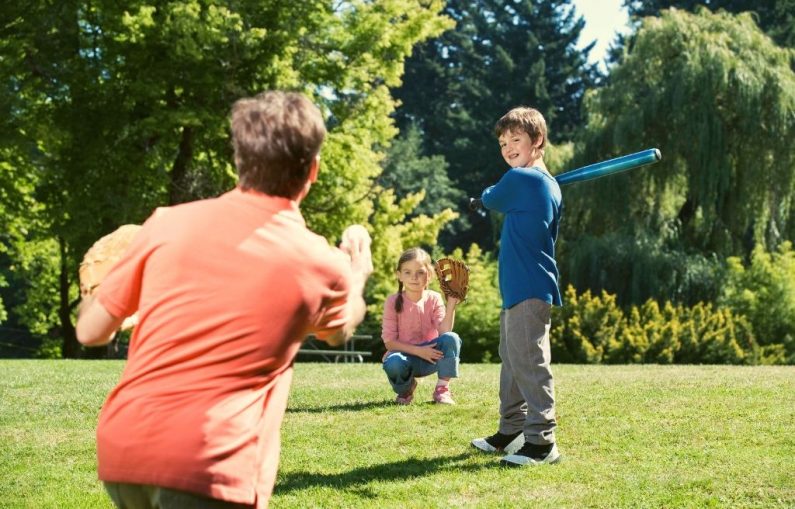Our boys just finished their summer baseball season here in Holland, MI. They really enjoyed themselves, but they had a big learning curve!
Three years ago, they both played tee-ball and had fun (although much of the time they were more interested in picking dandelions in the outfield than fielding a ball). Two seasons passed where we were in the process of moving, and they were unable to play because we didn’t know where we would be living during the baseball season. So now, after three years of not playing on a team, when they joined their peers to play, we realized how much they have missed.
Chris played baseball through high school, and it was one of his favorite sports (and he was pretty good!). After the first practice, watching the boys miss most of the balls thrown to them and seeing their wild throws after they did chase the ball down, Chris quickly realized he needed to give them some extra at-home coaching and lots of practice to get them up to speed with the rest of their team.
For the next couple of weeks, Chris took the boys out and played catch with them daily. The day their first game arrived, they had fun with their peers, and we could already see the improvement in their catching and throwing skills from the practice hours they had put in!
The thing that became apparent during the game was the lack of situational knowledge they had. After hitting the ball, they would just stand there. They didn’t realize they were supposed to run to first base and do it quickly! The next thing that became clear was when they caught the ball; they didn’t know what they were supposed to do with it. Should they throw it to the coach? Should they throw it to 3rd base? Or maybe first base?
After the first game, Chris was starting talking through different scenarios with them. He even drew a diagram of the field and bases and used the boys’ little army men to simulate a game. “Mr. Bazooka is a runner on 2nd, and Mr. Rifle is the batter. When Mr. Rifle hits the ball, where can you throw to get a force out?” They started reviewing the different scenarios and acting them out. They practiced batting and then dropping the bat and running as soon as they made contact with the ball. As they continued to practice and learn about the scenarios, their game greatly improved. By the last game, they were keeping up well with the other capable players on their team!

Now, this may be more about baseball than you ever wanted to know (I know I learned a lot of things right along with the boys), but the parallels with navigating life are numerous. In life, we come across new scenarios where we have no experience to draw from to determine what to do. Without an example, we are lost (standing in the outfield with the ball and not sure where to throw it). We need someone who has been down this road before and can show us how it is like us (in this case, a baseball player) to act.
Furthermore, this has parallels with the relational skills. Without practice, we are not likely to catch the ball, or even if we do, we are not likely to throw it well. Practice hones our skills and allows us to be effective in our goal (whether that is catching a pop fly or recovering from upsetting emotions). The more we practice, the more naturally we navigate life’s ups and downs. The more we help our kids practice recovering from upset, the more easily they will be able to calm themselves, and what used to feel like a mountain will begin to feel more like a speed bump. The more we practice appreciation with them, the more natural it will be for them to look for the good things around them.
I suggest you pick one or two skills this week that you want to make a point to practice daily with your kids. You may be surprised how much progress you see after just a week of intentional practice!




Thanks Jenn, super practical and good challenge to put the skills into practice at every opportunity. I think of my grown children as well and how to encourage them in applying these skills in an ongoing and increasing fashion.
Applying the skills with grown children looks different than with young children, and often seeing you apply the skills in your life is the best way to draw in your older children.
Great analogy. It is so amazing that what we don’t know doesn’t show up until we try. When relational holes show up we pick up the ball without condemnation of ourselves or the person that threw a curve and practice being who God made us to be. LIFE GIVING.😊